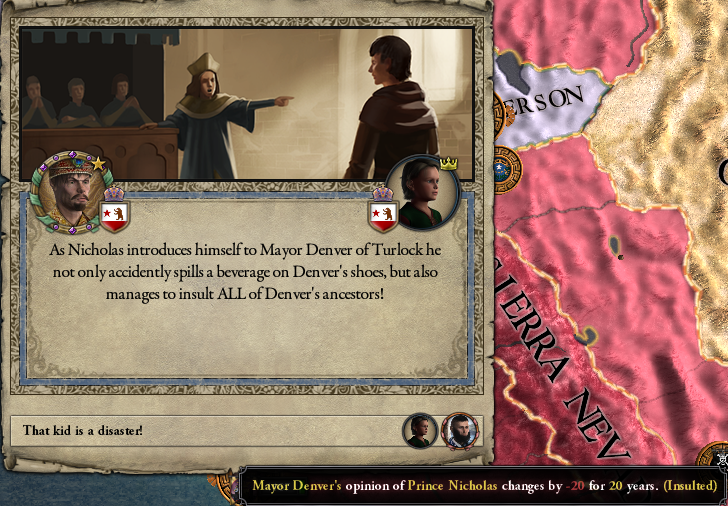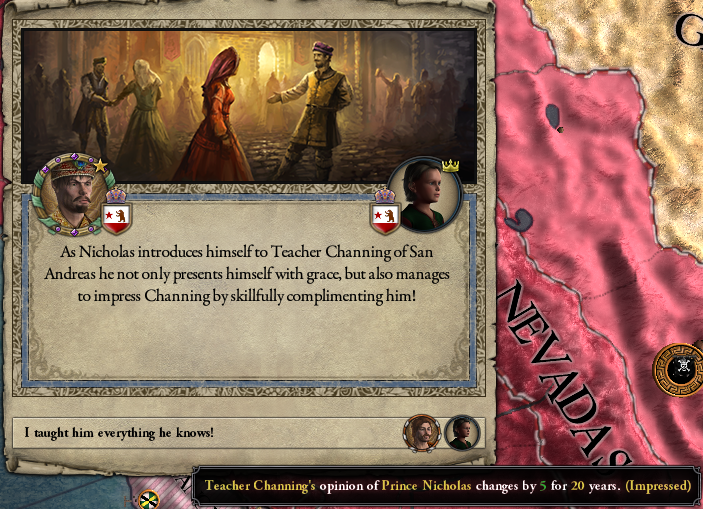Chapter 15 - A Bad End


In May, strange ships appear just outside of Goldengate, flying an unknown flag. The city’s bureaucrats grant the ship’s captain an audience, where he explains that they are simple traders from the mythical island kingdom of Hawaii, looking to establish new trade routes with their neighbors across the Pacific. The bureaucrats grant them a trading license, with the understanding that they will be forced to pay higher tariffs than local traders.

The Imperial bureaucracy also continues to be extremely good at collecting taxes for the crown, which is greatly appreciated during these dire times.


This tax money, as well as the money coming in from the new foreign trade, is used to hire several mercenary bands to help reinforce the Imperial Army. This turns out to be an excellent idea, as with fresh troops the Imperial Army is able to beat the Consumerists at the Battle of Fernley. Urged on by this victory, the Imperial Army manages to take Susanville, finally bringing the war to the Consumerists.


Even better news arrives in November: High Chairman Adam is dead! He died of an infected wound, following the Battle of Fernley, leaving his underage son to rule over the Consumerists. Almost immediately, the heathens splinter, as High Chairman Mellon claims that he is the true successor of the Prophet Adam, not the prophet’s son. He takes with him nearly half of the established Consumerist kingdom, greatly decreasing their ability to fight.

Emperor Pollock I uses the High Chairman’s death to boost his profile, proclaiming that it was only with his blessing that the Imperial Army was able to injure the man during the Battle of Fernley. A tired, desperate populace, eager for any sign that the emperor might live up to his father, accept this claim without much argument.




The Nevadan Reclamation is still a long way from being over, though with the Consumerists divided, it is mostly mop up work for the Imperial Army.


The Nevadan Reclamation ends in February of 2713 with a victory for the empire. The Prefecture of Nevada is given to Count Frank of Carson, a distant relative of High Chief Nolan II; the hope is that it will help mend fences with the Death Valley.

In the far north of Canada, the King of the Cree begins to transition from the nomadic life of his ancestors to a more sedentary one. If he manages to convince the other Cree lords to emulate him, a truly fearsome empire will be born.

The old royal armory in Tuolumne floods, threatening to destroy some family relics. The bureaucracy dutifully ensures that nothing is permanently damaged.

With some coaxing from the Imperial bureaucrats, Emperor Pollock I arranges for a feast to introduce his heir, Prince Nicholas, to the lords of California.

The Cree experiment as a settled tribe utterly fails, causing the budding empire to shatter into a million different domains, all of them competing to reclaim the title of the King of All Cree.




The day of Prince Nicholas’ introduction to the realm comes; initially, his quiet nature causes some friction between him and his future vassals, but with a little prodding, he finally comes out of his shell and manages to make a good impression on the assembled lords.

Teacher Channing even offers to further educate the prince in the intricacies of Cetic thought; eager to get back to drinking, the emperor agrees.


The Imperial bureaucracy continues to govern while the emperor spends his days doing literally anything else; they continue to expand their powers at the cost of Imperial authority.

In March of 2715, King Walter of Gran Francisco dies, leaving the throne to his grandson, Prince Lloyd; the new king is barely a year old. Sensing a chance to further expand their holdings, the Imperial aristocracy pressures the emperor into declaring war on the ailing kingdom. Eager for the glory of a cheap, easy war, the emperor bucks the directives of his bureaucrats and declares war with the goal of claiming the prefecture of Salinas.

As a consequence of his resistance to the bureaucracy, people begin to whisper that maybe, just maybe, the emperor is done being a puppet of the bureaucrats.


In May, the Imperial Army, headed by Emperor Pollock I, engages with the Franciscan army at San Benito; the emperor immediately gets hurt and loses one of his legs in the resulting scuffle. The Imperial Army still manages to beat the minuscule Franciscan force.

Emperor Pollock I, called “the Lecher” and “the Ill-Emperor” succumbs to his injuries on May 26th, 2715. A man of no great ambition beyond feasting, drinking, and bedding any woman that would have him, the Empire is better for his death. Under him, the Prefecture of Nevada was reclaimed from the Consumerists and the Imperial bureaucracy grew by leaps and bounds.
His son, now Emperor Nicholas I, is but a boy of 13 and is untested in the realm of Imperial politics. It remains to be seen if he will join his father as a figurehead emperor, or if he will blaze his own path in the image of his grandfather, Emperor Thao I.